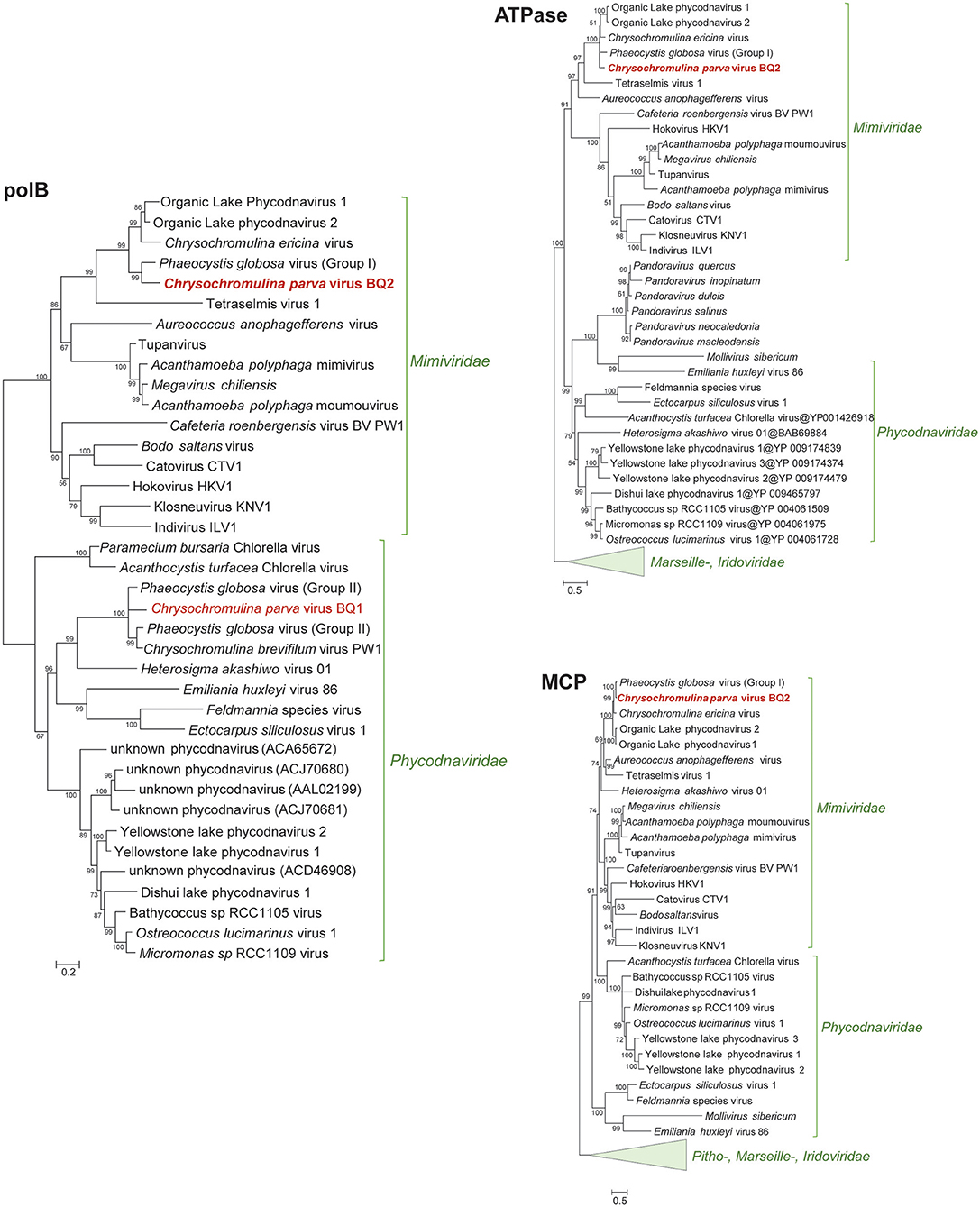
95% of researchers rate our articles as excellent or good
Learn more about the work of our research integrity team to safeguard the quality of each article we publish.
Find out more
CORRECTION article
Front. Microbiol. , 24 April 2019
Sec. Virology
Volume 10 - 2019 | https://doi.org/10.3389/fmicb.2019.00907
This article is a correction to:
Genome and Environmental Activity of a Chrysochromulina parva Virus and Its Virophages
 Joshua M. A. Stough1
Joshua M. A. Stough1 Natalya Yutin2
Natalya Yutin2 Yuri V. Chaban3
Yuri V. Chaban3 Mohammed Moniruzzaman1
Mohammed Moniruzzaman1 Eric R. Gann1
Eric R. Gann1 Helena L. Pound1
Helena L. Pound1 Morgan M. Steffen4
Morgan M. Steffen4 Jenna N. Black3
Jenna N. Black3 Eugene V. Koonin2
Eugene V. Koonin2 Steven W. Wilhelm1*
Steven W. Wilhelm1* Steven M. Short3*
Steven M. Short3*A Corrigendum on
Genome and Environmental Activity of a Chrysochromulina parva Virus and Its Virophages
by Stough, J. M. A., Yutin, N., Chaban, Y. V., Moniruzzaman, M., Gann, E. R., Pound, H. L., et al. (2019). Front. Microbiol. 10:703. doi: 10.3389/fmicb.2019.00703
In the original article, there was a mistake in Figure 2 as published. In the figure, the tree branch closest to Chrysochromulina parva virus BQ2 labeled as “Phaeocystis globosa virus (group II)” should have been labeled “Phaeocystis globosa virus (group I).” Similarly, the two branches labeled as “Phaeocystis globosa virus (group I)” and “Phaeocystis globosa virus” adjacent to Chrysochromulina parva virus BQ1 should have both been labeled as “Phaeocystis globosa virus (group II).”

Figure 2. Approximately maximum-likelihood phylogenetic trees of B-family DNA polymerase (polB), A32-like virion packaging ATPase (ATPase), and the major capsid protein (MCP). The polB tree is constructed on protein fragments corresponding to PCR amplicons reported in Mirza et al. (2015). When more than one MCP gene was present in a genome (Mimiviridae), a paralog closest to Phycodnaviridae was chosen for the MCP tree. Node support (aLRT-SH statistic) >50% are shown. Accession numbers for the polB sequences are provided in Supplementary Table 1.
The authors apologize for this error and state that this does not change the scientific conclusions of the article in any way. The original article has been updated.
Keywords: giant viruses, algae, NCLDV, freshwater, virophage, genome
Citation: Stough JMA, Yutin N, Chaban YV, Moniruzzaman M, Gann ER, Pound HL, Steffen MM, Black JN, Koonin EV, Wilhelm SW and Short SM (2019) Corrigendum: Genome and Environmental Activity of a Chrysochromulina parva Virus and Its Virophages. Front. Microbiol. 10:907. doi: 10.3389/fmicb.2019.00907
Received: 08 April 2019; Accepted: 09 April 2019;
Published: 24 April 2019.
Approved by:
Frontiers Editorial Office, Frontiers Media SA, SwitzerlandCopyright © 2019 Stough, Yutin, Chaban, Moniruzzaman, Gann, Pound, Steffen, Black, Koonin, Wilhelm and Short. This is an open-access article distributed under the terms of the Creative Commons Attribution License (CC BY). The use, distribution or reproduction in other forums is permitted, provided the original author(s) and the copyright owner(s) are credited and that the original publication in this journal is cited, in accordance with accepted academic practice. No use, distribution or reproduction is permitted which does not comply with these terms.
*Correspondence: Steven W. Wilhelm, d2lsaGVsbUB1dGsuZWR1
Steven M. Short, c3RldmVuLnNob3J0QHV0b3JvbnRvLmNh
Disclaimer: All claims expressed in this article are solely those of the authors and do not necessarily represent those of their affiliated organizations, or those of the publisher, the editors and the reviewers. Any product that may be evaluated in this article or claim that may be made by its manufacturer is not guaranteed or endorsed by the publisher.
Research integrity at Frontiers

Learn more about the work of our research integrity team to safeguard the quality of each article we publish.